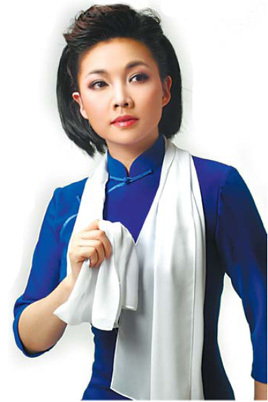With her long colored and curly hair, baby face and sweet smile, fast-talking soprano Wang Li, 26, looks nothing like Jiang Jie, the nationally-known Communist heroine of China's civil war, whose story has been adapted into novels, operas and films.
Last July, despite many doubts and objections, the Performing Arts Company of China's Air Force took the risk and chose the young singer to play the famous heroine, when they revived the opera repertoire "Jiang Jie."
Wang was chosen over more than 100 competitors. "Her performance exceeded our expectations. She did a lot homework and gave her own interpretation of the Communist heroine that was more touching," says Yan Su, who wrote the lyrics.
"Jiang Jie" will run from June 10 to 13, as part of the ongoing opera festival of the National Center for the Performing Arts. It is based on the true story of Jiang Jie, who led the underground fight against the Kuomintang and continued to lead even after she was imprisoned, until she was killed. The seven-scene opera by the Performing Arts Company of China's Air Force, premiered in 1964.
 |
|
Soprano Wang Li aims to be a cross-over diva like Sarah Brightman. [File photo] |
The music, drawn from several folk music elements popular in Southwest China, is composed into solos, duets and choral songs and supports the dramatic portrayal of the heroine. The opera was so well-liked that it was performed nearly 300 times, by different troupes, in the years following its debut. The theme song "Eulogy to the Red Plum" was one of the most popular songs of the 1960s and 70s.
Playing the title role posed a great challenge for Wang, especially at a time when revolutionary themes are not as popular with the people.
"I watched several old video versions and found that many of Jiang Jie's gestures and expressions looked very stiff and unnatural. The acts focused on the intense hostility between Jiang Jie and the enemies who tortured and killed her and many other Communists. This was well received by audiences in the 1960s but may not go down as well with today's audiences," says Wang.
"I had to present a balanced portrayal of, on the one hand, a brave Communist who faced death, and on the other, a woman who loved her husband and son as well as her fellow men."
To prepare for her role, Wang read the novel version of "Jiang Jie," visited the prison in Chongqing where she died and listened to many survivors tell her story. "She [Jiang Jie] is first a woman, a wife and mother and then a tough heroine."
"In the old version, Jiang Jie never cried and even the lyrics of one of the songs said, 'Don't cry when they shoot me', but why should she not cry? Her husband is killed in front of her, how can she hold back tears?"
Wang also bagged the role for her coloratura voice and experience in performing opera.
Born in Hefei, Anhui province, Wang took to singing at a young age. In 1994, she joined the Anhui Arts School and three years later, was admitted to the China Conservatory of Music.
In 2001, she took part in the New Voice competition held in Germany and won the award of "Best Coloratura Voice". Although she was offered a scholarship, she chose to return China.
In 2003, the China Central Opera House collaborated with French artists to produce the opera "The Tales of Hoffman." Wang accompanied her friend to the audition. As she waited her turn, she hummed the "Laughing Song" from Mozart's opera "Die Fledermaus." When the French director Daniel Mesguich heard her, she was cast in the lead role of "The Tales of Hoffman."
It was while performing in the full-length Tales of Hoffman that Wang got interested in Western opera.
"My ambition is to be a cross-over diva like Sarah Brightman," she says.
(China Daily June 3, 2009)